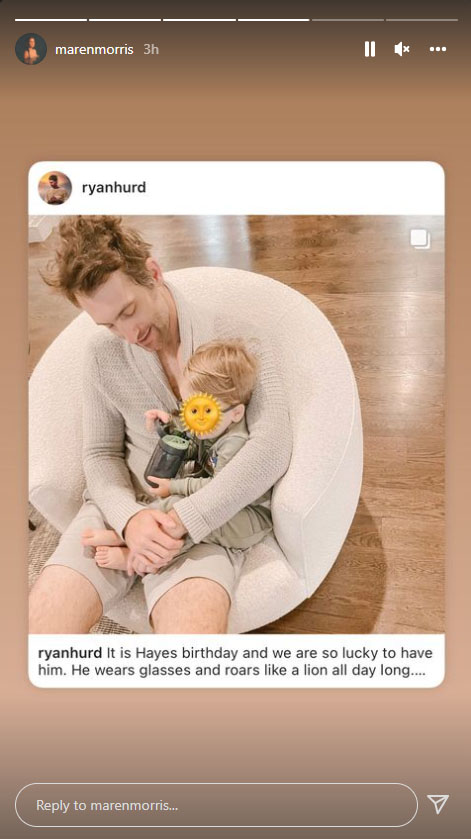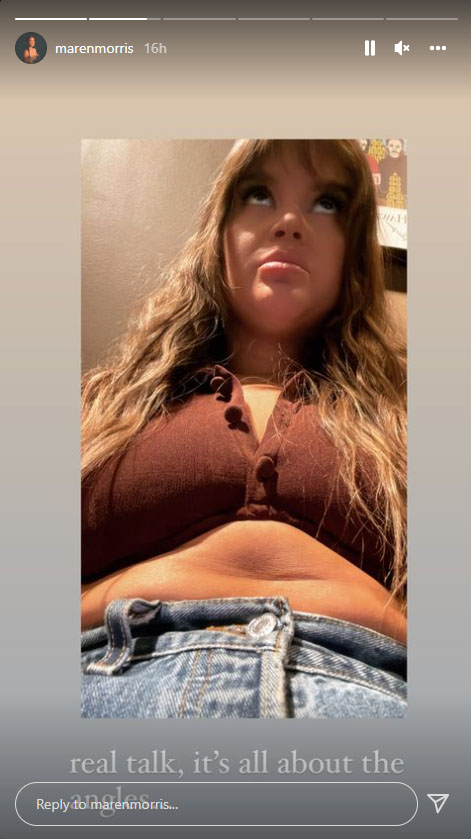Maren Morris’ new album, Humble Quest, drops on Friday. Like most of us, Maren struggled with the long stretch of the pandemic. To complicate things, Maren, who had her son Hayes in March 2020, was also struggling with post-partum depression. Only she didn’t know it and it took her therapist and husband to help her realize what was going on. Fortunately, she did figure it out and got help. But she’s looking out for others who may be going through the same thing. She wants folks to know that sometimes all it takes is asking if they’re “ok” to get to the root of a problem.
Maren Morris is opening up about her mental health and her marriage.
In the new issue of PEOPLE, the “Circles Around This Town” singer reveals that her husband, fellow singer-songwriter Ryan Hurd, helped diagnose her postpartum depression after welcoming their son Hayes Andrew in March 2020.
“I do check-ins all the time [with] therapy, which I’ve done for years, and my husband was a huge help diagnosing that too,” Morris, 31, says of her postpartum depression, which began to ease as Hayes turned 6 months. “Sometimes it’s just someone really close to you saying, ‘Are you OK?’ It’s so simple, but it kind of snaps you out of whatever fog you’re in that you think is normal, but isn’t.”
Between her postpartum depression and the weight of the pandemic, Morris — whose new album Humble Quest drops Friday — is more cognizant about her mental health than ever.
“I’m pretty sure everyone in lockdown and this pandemic has had to do a temperature check on their mental health, and maybe it’ll become a more perpetual practice going forward because of these two years — I hope it is,” she says. “I just think there’s not a stigma as much around talking about it and reaching out for help. It’s been such an amazing thing to know that I haven’t been alone in this, that other women have all been dealing with the same exact fears and anxieties; even just knowing that if I wake up in the middle of the night with a panic attack, I know that I’m not the only one.”
“Sometimes it’s just someone really close to you saying, ‘Are you OK?’ It’s so simple, but it kind of snaps you out of whatever fog you’re in that you think is normal, but isn’t.” This might sound over-simplified, but I get where she’s coming from. One of the things about depression is you think nobody notices, either because you’re trying to hide it or because you’re in the stage of feeling invisible to the world. It’s dangerous, because it allows you to sink lower. Somebody close asking “are you ok?” can let you know that you are presenting symptoms, and that you’re seen. As Maren said, sometimes that can be the thing to pull you back.
I agree with Maren that I think the pandemic changed how people look at their mental health. Not only did we observe each other much more closely, there were so many more pressures on all of us. All of that, compounded with the issues igniting around us, made people shrug off the grin and bear it ideology. Even if it’ s just a phone call to a friend, a rant on social media or saying the bad stuff out loud. It’s healthy and I’m glad we’re evolving in this direction.
Back to the “are you OK?” quote from Maren, I want to end on that because I cannot emphasize enough how much that means to someone who’s hurting. They may not be able to answer completely, but the fact that you asked will mean something to them. I promise.
Photo credit: Insagram













YES on asking someone if they are okay. When my father was dying of ALS, none of my graduate school friends spoke with me about it, and I also didn’t talk about it because I only knew my peers for a few years and it was a painful subject. However, when one peer of mine sat me down and asked me, “Are you okay?” I felt like I was seen and heard. I actually cried. I will never forget how grateful I was when she asked.
@hellodolly! Thank you for sharing your story and experience.
This is *so* important. My mom was very close to one of her friend’s daughters, and we lost the daughter at 15. Wonderful parents, amazing family, they had seen the depression and gotten her into therapy, it all happened really fast. So now I always ask people if they’re okay, what they’re struggling with. And if someone I’m close to talks about struggling I ask really direct questions – have you thought about harming yourself? Have you thought about suicide? Do you have a plan of who to tell if you start having those thoughts? I think it’s really important to be matter of fact about suicidal ideation.
I’m going through something right now, and I can’t tell you how grateful I am for each friend and co-worker who saw that I wasn’t okay and asked if I was ready to talk about it. It means everything to feel seen and heard. I’d also like to normalize answering “no, I am definitely not okay” instead of “I’m fine”. I’m working on that, and it is liberating.
I can’t remember the last time someone asked if I was okay. Most of the time people ask “How are you doing?” or “What’s going on with you?”. I’ve always answered evasively because I don’t want to dump all my s*** on people when they don’t want the real answer. I’ve been struggling with depression for a very long time and am only now starting to dig myself out due to a combination of meds. I started seeing a new therapist in Sept and that has helped. But you truly would not know I’ve been struggling if you looked at my Instagram Stories. People are good at hiding parts of themselves